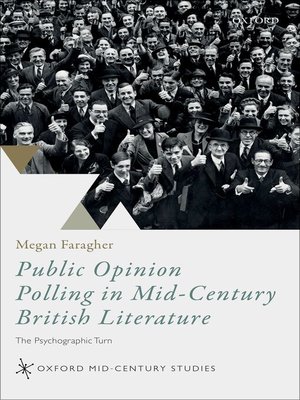Public Opinion Polling in Mid-Century British Literature
ebook ∣ The Psychographic Turn · Oxford Mid-Century Studies
By Megan Faragher

Sign up to save your library
With an OverDrive account, you can save your favorite libraries for at-a-glance information about availability. Find out more about OverDrive accounts.
Find this title in Libby, the library reading app by OverDrive.



Search for a digital library with this title
Title found at these libraries:
| Library Name | Distance |
|---|---|
| Loading... |
Whereas modernist writers lauded the consecrated realm of subjective interiority, mid-century writers were engrossed by the materialization of the collective mind. An obsession with group thinking was fuelled by the establishment of academic sociology and the ubiquitous infiltration of public opinion research into a bevy of cultural and governmental institutions. As authors witnessed the materialization of the once-opaque realm of public consciousness for the first time, their writings imagined the potentialities of such technologies for the body politic. Polling opened new horizons for mass politics. Public Opinion Polling in Mid-Century British Literature traces this most crucial period of group psychology's evolution—the mid-century—when "psychography," a term originating in Victorian spiritualism, transformed into a scientific praxis. The imbrication of British writers within a growing institutionalized public opinion infrastructure bolstered an aesthetic turn towards collectivity and an interest in the political ramifications of meta-psychological discourse. Examining works by H.G. Wells, Evelyn Waugh, Val Gielgud, Olaf Stapledon, Virginia Woolf, Naomi Mitchison, Celia Fremlin, Cecil Day-Lewis, and Elizabeth Bowen, this book utilizes extensive archival research to trace the embeddedness of writers within public opinion institutions, providing a fresh explanation for the new "material" turn so often associated with interwar writing.







